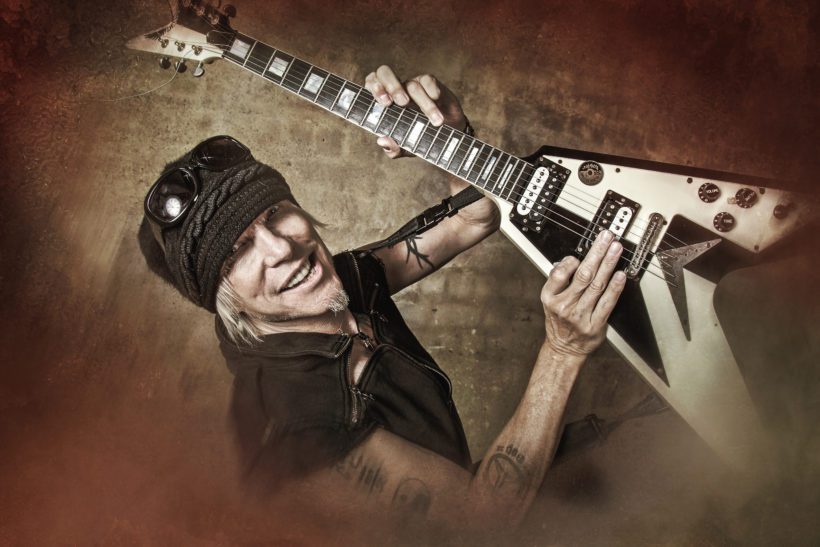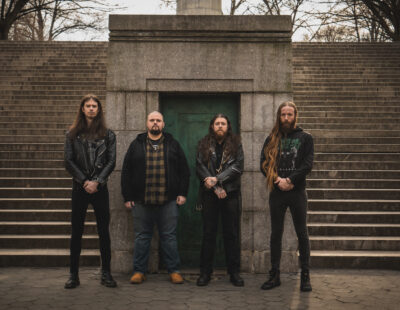
Scorpions, UFO, MSG: Michael Schenker should need no intro. Blitzkrieg German axe maniac, 64, he blazed a lightning path for futurists like Steve Harris, Randy Rhoades, and Kirk Hammett to shoot (shoot) on through.
Finishing a spring U.S. tour, which began with three nights at L.A.’s Whiskey A Go Go last month and concludes this week in Austin, the guitarist basked in the afterglow of completing a follow-up to last year’s Michael Schenker Fest debut Resurrection on Nuclear Blast. An all-star grouping of 1980s MSG frontmen Gary Barden, Graham Bonnet, and Robin McAuley, MSF is his comeback of sorts. Decibel’s April 2019 Hall of Fame for 1982 whiplash Assault Attack barely slipped under some cosmic finish line after the sudden death of its drummer Ted McKenna.
There’s been two notable deaths in the MSG camp recently, beginning with Ted McKenna earlier this year.
Michael Schenker: We had a big, big smack in the face with Ted McKenna, our drummer, dying on the 19th of February. We were in the midst of our recording, so dealing with that was very, very hard to do. I only carried on by saying, “I’m sure Ted is saying, ‘Keep on rocking.’” I looked around to see what could be done here and we got Simon Phillips, who is on the first Michael Schenker Group album, and Bodo Schopf, who was on the McAuley Schenker [Group] Save Yourself and Perfect Timing albums. Both of them helped us. Simon Phillips played on 10 songs from the new album, and Bodo on three.
Simon wasn’t available for touring, so I took Bodo with me to the U.K. We worked our butts off finishing the album. And you know, it’s a lot of stuff, because we have a 150-minute show and 13 songs to learn after Ted’s passing. We managed to finish the album in time, did the mastering, then invited international press for a listening session, and the response was excellent. We finished the album cover, released two singles, and did a video shoot. Then we had our first show at the Whiskey A Go-Go, where all my life as a musician started – first time in America as an 18-year-old. So, it’s like full circle.
You know, I always had stage fright, but in 2008 something happened. I said to myself, “Let’s go onstage. I want to be onstage.” I took that as a sign to enter the third part of my life. The first part, I had no clue what I was doing. Unconsciously, I was just enjoying my music and all of a sudden I was a star. Then I went into the arena. I wrote a song [about it]. I have two tattoos on my back: “Born to Overcome” and “Born to Be Free.” So, then the second part was the school of life, just going through everything. Now the third part is carrying on what I put on hold after the first part. That means going back to the roots of Michael Schenker after Strangers in the Night and Lovedrive. Now I’m enjoying consciously what I created in the beginning and making up for what I put on hold in the middle years.
Playing the Whiskey at 18 on your first tour with UFO?
Yes, I think it’s something like that. There was also the Starwood [Club in 1976]. We even had Van Halen supporting UFO at some point in the very early part of my first experiences in America. But I’m pretty sure the first concert was the Whiskey A Go Go in Los Angeles, and then the second concert was in San Francisco in front of 6,000 people, and everybody was holding a lighter in their hands. It was unbelievable.
Funny you mention Van Halen. What was your initial impression of Eddie Van Halen?
I didn’t see him. I didn’t know who that support band was. I didn’t pay any attention. I haven’t listened to any music for half a century now, because my vision was pure self-expression and still is, and I don’t listen to music so I don’t get tired of it and get consumed. I knew intuitively what I had to do in order to keep fresh for as long as possible. By writing from within, I’m not part of any trend. Just the opposite: I’m a trend maker. In the Seventies, that was my assignment. I created a trend for the Eighties. But I must tell you one thing: When Van Halen did the first album, I couldn’t ignore it.
Eddie Van Halen, I never knew him until he made the first album, and I was blown away by it. Of course I didn’t know he had a special technique of tapping [laughs]. I didn’t know what that was, so I was quite confused about how he was making that noise with a [guitar] pick. That was obviously very confusing for many people. How can he sound like this? But even regardless of a tapping technique, he is a very melodic, fantastic player, and one of my favorites, actually. And I cannot compare him to many people, because I never listened to anybody.
The only other person I couldn’t help but overhear was Yngwie Malmstein, because he was playing faster than lightning – faster than the speed of light – and that was sensational. Based on that, I had to pay attention to him, but I found out very quickly that it was very repetitive. Those are the only two guitarists on my whole journey of 50 years that I paid attention to other than, of course, the people that I looked up to and that inspired me like Jeff Beck and Leslie West, all the great guitarists from the late ’60s.
I used to go guitar hunting, trying to discover new guitar riffs – something extraordinary. Then when I turned 17, I stopped listening to music altogether. I knew I had to do it the way I see it, so I did it from within. As a result, it turned out unique, because nobody knows what goes on in somebody else’s head. Each one of us holds very unique ideas that are not known to other people until we release them. I somehow knew intuitively that that’s what I needed to do. So, whatever came out of me, it was very attractive to other musicians or other people, because it was always something, like, “I never heard that before. What is this?”
I never knew that. I only found out later in life, and I only found out now what happened to me. I’m getting revelations now. That’s why the [upcoming] album’s named Revelations – about my life and who I am. A lot of stuff is coming to the foreground based off me having a life lived. That wisdom of saying, “Be true to yourself and everything will come to you and more,” it’s just a theory when you’re 20 years old, but if you actually live like that for a whole lifetime, then you find out it’s a fact, because it’s happening to me.
For people unfamiliar with your work, I compare you to Eddie Van Halen: super fast and super melodic. Where his solos can be disjointed, however, yours unfold perfectly fluid. Do you build your solos, or let them occur in the studio?
Both. Let’s start with “In Search of Peace of Mind” [from 1972 Scorpions debut Lonesome Crow], which was the first song I ever wrote. The solo in it is timeless. There’s nothing wrong with it. Beng played by a 15-year-old, that came from nowhere. I have no idea how that came to be. The rest of the album you can hear an undeveloped guitarist, but the one solo, “In Search of Peace of Mind,” up to this date, it’s extraordinary. Again, there’s nothing wrong with it, just like “Theme for an Imaginary Western” by Leslie West. If I hear it today, there’s nothing wrong with it. It’s just beautiful.
Many songs that I wrote with UFO started as instrumentals. “Doctor Doctor” was an instrumental, and then Phil Mogg liked it so much, he said, “Let’s meet. Play me the chords without the guitar and let me see what I can do with it.” Then he came up with the ‘doctor doctor’ stuff, so that’s how that song was born. Then “Try Me” was also an instrumental. Phil Mogg heard it and he said, “Oh, I love this. Can you take the lead guitar away and just give me the chords so I can make something out of it.” That’s how “Try Me” came together. It happened with quite a few songs.
Then, of course, there were other songs, where I would simply improvise the solo. Usually the rock songs, the faster songs, I would just improvise. Other songs I would want to double track something. It came in all sorts of different ways, but the main thing is, it always came from my spirit, from within myself – how I see it in putting together a combination of notes that would give you goose pimples. That was not attached to any trend or anything out there. It was just the way I felt about putting a couple of notes together that would create a reaction funneling or turning into a happy feeling.
Lonesome Crow remains so atmospheric, but like you said, the guitarist is still coming into his own. By the time UFO’s Phenomenon rolls around two years later, on “Rock Bottom” you’re playing much faster. Where did the speed come from?
It’s development. You just keep playing. And while you’re playing, you become automatically more fluid. I call it play and discover. It’s that treasure hunting to find new riffs and pieces. In the early days, I figured out some stuff and tried to play better and better, und faster. I never used any scales, any existing scales. I would always put my own notes together, play them, and then try to play them fluent. That’s all part of development. That happened all the way up to Strangers in the Night. Every album, I can hear an improvement on the development: on the vibrato level, on the combination of speed and slow, etc., etc. I can hear that development even on Lovedrive, with the Scorpions when I helped them out.
Basically, intuitively I knew that era was coming to an end and I wanted to do something more. I knew somehow that I was entering a new phase and that was including a lot of experimenting with music. Like I did [instrumental] albums where I go from one riff to another to another; you can make 10 albums out of one album, like Dreams & Expressions [2001] and Adventures of the Imagination [2000]. People don’t even know that these albums exist and they probably will find out later in life as I keep going back into the place where I came from, because I’m back to the roots – 16, 17, 18 years old – so people rediscover me. As they do, especially newcomers, they will go through my past and they will discover so many albums.
You know, I was born the same date as Frank Sinatra. He had a similar life structure. He came in the beginning with a boom, and in the middle years he disappeared and did whatever he did, and then he came back again, and he did like 50 albums. I have done about 70 albums myself, I think, and [laughing hard] people don’t know most of them. They only know the ones I did up to ’78, ’79, and then I carried on with the second part of my life and did MSG – Michael Schenker Group, McAuley Schenker Group – and then starting 2000, I went to the next level. I was experimenting.
Actually, 1990-2005 was when I completely disconnected. I moved to Arizona, opened my own record company, did a thank-you album [2001’s Thank You], instrumental albums, experimentals, built a recording studio. I lived in Arizona for 15 years, completely isolated. People didn’t hear much from me. Then in 2008, I lost my stage fright and I took that as a sign to start the third part of my life. I am celebrating now. Because I’ve changed 180 degrees from the shy, fragile teenager – stage fright teenager – into a frontman who wants to be onstage. I’m enjoying it so much. So, the middle years I’m very grateful for, because they were teaching me. They helped me to develop to that point.
What’s the connection between all that time in Arizona and then losing your stage fright not long afterward?
Yeah, the middle years, I call it, starting from MSG. “Into the Arena” and the school of life. School of life – dealing with real issues, dealing with crisis, dealing with obstacles, dealing with challenges. These are all training tools that need to be there in order for a person to develop. What doesn’t kill you makes you stronger.
You overcame the passing of Ted McKenna; what are your thoughts on the death of both UFO and MSG bandmember Paul Raymond on April 13?
Yeah, just equally shocking. That guy was never… Because he looked so young, I only sometimes realized how old he was [73]. He was 10 years older than me, but you’d never look at him as that age, because he looked so young. The last time I saw him was quite a while ago, but when I saw him, he looked so young. He would be the last person I thought would die. Out of my generation, people that are close to me or people that I know… My world is getting smaller and smaller and the older I get, the faster my world becomes smaller and smaller.
As more and more people die that I know – Elliot Rubinson from Dean Guitars, [onetime MSG singer] David VanLanding; quite a few people have passed away unexpectedly in a short amount of time, people I would have never thought would die that early – somehow what it does to me at this point in time is it starts to create a bridge to the other side.
These people have gone somewhere that I will be going, too. Somehow I’m turning it into something unique. It does that inside of me automatically, because we all have to go. There’s no point denying that, so I embrace it. I open up toward that, and it helps me to accept death more and more, and easier. It’s some kind of preparation. The system of life is so highly intelligently designed that it’s inconceivable, but everything is perfect. It’s so incredible that even things like that have positive aspects.
We look at everything from the ego and ego is very scared – of losing life. But spirit is not. The more we connect to the ego, the more scared we get. The more we connect to the spirit, the less scared we are. So it helps me to look at it like they’re ahead of me and I will follow. I used to be so scared of death, but the older I get and the more people around me are dying, I feel like that’s preparing me to accept it, which makes it easier.
It’s hard for young people to understand. Everything an older person says is hard for younger people to understand. My mom always used to say to me, “Michael, when you get to that age, you’ll understand what I mean.” And I said, “I don’t know. There’s nothing really to understand.” But there is [laughs]. Life is life. The moment you are born you are subject to death, so the main thing to focus on is now. The now is the only thing we have.
Paul Raymond was a fantastic musician. He loved rock ‘n’ roll. He lived for rock ‘n’ roll. That was his life. That’s what he wanted and he lived it all the way. My dad died at 77. He was an architect. That’s only a few years later than Paul, but my father looked much older than Paul did. That was the shock basically: He looked so young but he died out of the blue. It’s very shocking. Very shocking. But realizing that he actually was pretty old….
When I heard about Mick Jagger having a heart problem, he’s the last person I think would confront that. So you never know what happens next, which is the way it’s supposed to be, but that’s not the point, actually. It’s not to focus on death. It’s to focus on now. To make the best out of now, to enjoy now. You never know if you will wake up tomorrow morning. And that’s it.
This idea of a bridge, what part does the guitar play in that?
When I went through the school of life, I had a realization. Something happened and I said to myself, “Michael you have to have two priorities that you stick with, the most important things that you love, which is: My creator and the guitar playing. And I took care of that all my life. That’s all I focused on. I personally think that the music is an assignment, something I came here for, to maybe inspire spirits into that world, and the spiritual aspect is something that keeps me strong and keeps me connected to where I come from.






